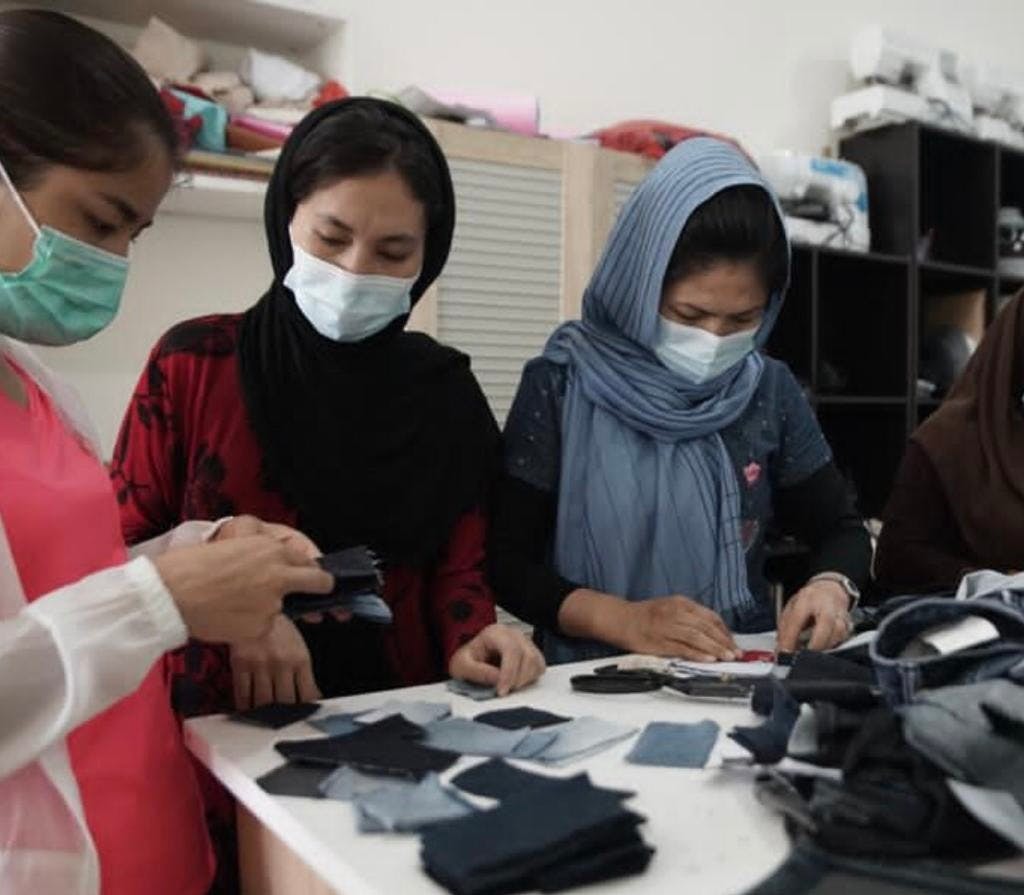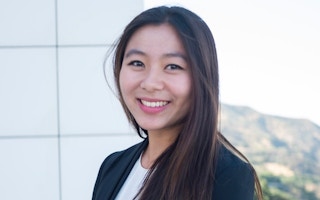After leaving everything behind, many refugees around the world struggle to survive.
To continue reading, subscribe to Eco‑Business.
There's something for everyone. We offer a range of subscription plans.
- Access our stories and receive our Insights Weekly newsletter with the free EB Member plan.
- Unlock unlimited access to our content and archive with EB Circle.
- Publish your content with EB Premium.
In Indonesia, the majority of refugees are stuck for several years before they can be resettled to other countries such as Australia, Canada or the United States. While staying in their host countries awaiting resettlement, one of the most important things that refugees need, but often lack, is paid work. Work gives them a sense of purpose, a way to secure their dignity and to provide for their families.
One organisation that is lending a lifeline to refugees in Indonesia by providing income earning opportunities for them is Liberty Society, an Indonesian social enterprise that specialises in supplying businesses with locally-made, sustainably-sourced clothing and merchandise.
Co-founder and chief executive of Liberty Society Tamara Gondo tells Eco-Business that she became interested in social justice when she went on a mission trip in 2012 while she was in middle school, to Manado in North Sulawesi, Indonesia.
“That was when I saw a lot of inequality,” said Tamara, who grew up in Jakarta and holds a bachelor’s degree in communication studies from Biola University. “There was a lack of support for people in poverty.”
Inspired to improve the lives of poor communities, Tamara started a non-profit called Second Chance Initiative which focused on sponsorship for children and microfinancing for households. After five years running the non-profit, Tamara, who was Miss Indonesia Jawa Timur 2019, realised that she needed a more sustainable business model. This led her to jump into social entrepreneurship and start Liberty Society in 2019.
Today Liberty Society employs 25 refugee women from Afghanistan. In Gading Serpong, a township west of Jakarta, where they work and reside, these women sew t-shirts, dresses, jackets, tote bags and pouches using sustainably-sourced materials such as bamboo, cotton, or even waste fabric. Liberty Society also goes out of its way to avoid plastic packaging and uses cassava instead.
The company produces an impact report to be transparent to businesses, which are their main clients, about the materials that they use.
Liberty Society’s customers are mostly socially conscious organisations based in Indonesia and Singapore, including fashion brands that want to ethically manufacture their items.
“We cannot change the fashion industry alone. We have to work with corporate brands and consumers,” said Tamara.
In 2021, Liberty Society, the United Nation’s refugee agency UNHCR and Japanese retail brand Uniqlo teamed up to repurpose denim offcuts into drawstring pouches and cardholders. As part of it its latest initiative, Tamara said the company is working with Deloitte Indonesia to turn plastic waste into upcycled products such as laptop sleeves.
In this interview, Tamara talks about the difficulties that refugees face in Indonesia, how Liberty Society looks after their well-being, and how her background in the beauty pageant world has helped her career.
“
Refugees are deprived of a lot of learning and growth opportunities. In that sense, it feels like their life is on hold before they get resettled.
A lot of organisations claim to support ethical fashion. What sets Liberty Society apart?
We are able to successfully implement our training-to-employment model in Indonesia. Most companies just hire people who can sew, but we take our time to train our employees and pace the training according to their growth. Also, instead of our staff just receiving payment for their work, we ask them first – would this be enough for you? So, the fair living wage aspect is something that both parties agreed on.
We also provide community support for the staff. Other than employing them, we also care for their children’s well-being. We do this by giving them financial workshops, by helping put their children in school through partnering organisations, and by working with organisations who give them food donations.
Tell us more about the refugee and asylum-seeking situation in Indonesia. What difficulties do these refugees face? What is the typical profile of a refugee woman that Liberty Society employs?
The way I would describe it is they are living in prisons without walls. They don’t have an outlet for creativity, they don’t have freedom of movement. Refugees are deprived of a lot of learning and growth opportunities. In that sense, it feels like their life is on hold before they get resettled. If they do go to resettlement countries, they are also often not skilled enough to compete in the job market there.
Eighty per cent of the refugees in Indonesia are from Afghanistan, about 40 per cent are children and half are of working age. We usually work with those who are refugees, not asylum seekers. They have a stamp of approval from UNHCR to be here in the country.
We vet them through our partnering organisation, which is the Learning Centre. The refugees that we employ must be looking for work, be willing [to work], are active in the community and have good behaviour. So there is accountability there.
We partner with UNHCR, which is their livelihood partner, to give training and job opportunities for these refugees. Apart from us, in Indonesia, there are no other alternatives for them to get an opportunity like this to earn an income. They usually get digital work elsewhere. 90 per cent of the refugee community are not able to earn any type of income. They just receive donations from charities.
What benefits do you give to refugees you employ? What is the difference between refugees working at Liberty Society and those seeking employment elsewhere?
Most of them are the sole breadwinners for their families. By working with us, they have income to pay for their family’s basic needs or savings for the next country [they go to]. They are able to send money back to their home country too.
Compared to other employment, I would say we give them more stability in terms of the income they are able to make. It is not a one-off project. When they engage with us, they know that we are in this for the long run.
One issue that Liberty Society looks at is the mental wellbeing of the refugee women you employ. What are some of the issues these women face? How does Liberty Society help?

Refugee women handling fabrics at Liberty Society. Liberty Society provides upskilling opportunities for refugee women through training and employment. Image: Tamara Gondo
We had one single mother with two children, whose husband was killed by the Taliban. She struggled with depression because she kept thinking about how to raise her two children without any income. She was 40, came to our centre as a trainee and has been with us for almost one year and a half. Now she can focus on being productive and that has improved her mental health. She told us that instead of “time using her”, she is making good use of time now. Her children come along with her to the centre. They have a safe space to learn and play where she can watch over them. We have seen how she has become a lot more cheerful.
We also do community activities once a month for them to mingle and build trust with one another. It adds to the social capital that they have. We don’t force them to work from nine to five – if they feel like they can work more, they are rewarded based on that.
How can Liberty Society influence consumer behaviour and persuade your customers to shop more sustainably?
There are two ways. First is telling the story about the product. In all our products, we tell people who makes the product, what is the impact of the product, and the stories behind the product. So, it is very clear. Hopefully this inspires people to be more generous and mindful of their purchases.
Second is through our marketing efforts both online and offline. For example, we held an exhibition for 28 days in a prestigious mall in Jakarta to showcase our products and the different green brands and artisans that partner with us. During the exhibition we educated consumers about conscious consumerism. They can then purchase those items directly at a e-commerce site. We made it easier for our customers to be exposed to greener products at a price that is affordable for them too.
What do you think are some of the most pressing issues in the fashion industry?
Workers are underpaid and working in an unsafe environment. There are a lot of factories here where the workers are not paid enough for them to sustain their daily lives. Secondly, when the fashion industry produces collections, it generates so much waste. What we really want to do is to change the behaviour to use upcycled or recycled materials. The next step we want to do is to engage brands to use cotton recycled from unused clothes.
You were Miss Indonesia Jawa Timur 2019. Has your background in the pageant world been a boon or bane for your career in sustainable fashion?
It [being in the beauty pageant] was before I started the business, so it became a launching platform for me to start my business. It provided me with good connections to the influencers and the media, and helped me connect with companies who want to stay relevant with millennials and Gen Z.












